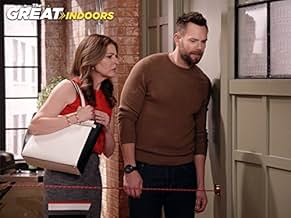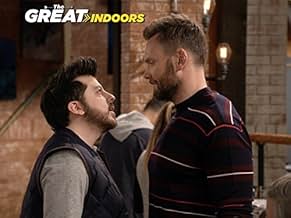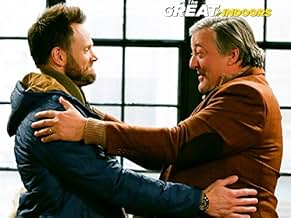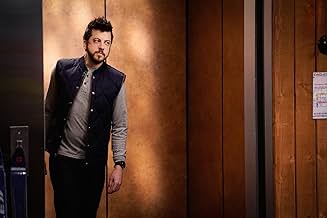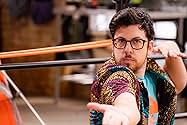AVALIAÇÃO DA IMDb
6,2/10
3,6 mil
SUA AVALIAÇÃO
Adicionar um enredo no seu idiomaAn adventure reporter must adapt to the times when he becomes the boss to a group of millennials in the digital department of the magazine.An adventure reporter must adapt to the times when he becomes the boss to a group of millennials in the digital department of the magazine.An adventure reporter must adapt to the times when he becomes the boss to a group of millennials in the digital department of the magazine.
- Prêmios
- 1 vitória e 1 indicação no total
Explorar episódios
Avaliações em destaque
Joel McHale tickles me, but miscast as outdoors stud.
Stephen Frye is good. The millennials suck, or blame the gawd-awful writing.
I would laugh a couple times per episode, but not worth the other 28 minutes of pain.
Stephen Frye is good. The millennials suck, or blame the gawd-awful writing.
I would laugh a couple times per episode, but not worth the other 28 minutes of pain.
There are certain comedic concepts that lazy joke writers love. These involve things like mothers-in-law warring with daughters-in-law or residents of Alabama trailer parks marrying their sisters. They require no cleverness or originality, just a knowledge of how such jokes are structured and the ability to recall previous jokes and change them around a little.
The Great Indoors is a show that always goes for the easy, obvious laugh. It's the sort of show that, even when you do laugh - which happens rarely - you don't enjoy the laugh that much, because you've already laughed at that joke hundreds of times before.
The premise is simple. A macho, outdoorsy writer is forced to take an office job amongst callow millennials. He teaches them something about "real life" and they teach himself about the "modern world."
The first thing I find odd about this series is that the clueless old guy is a Gen-Xer. I know a lot of Gen-Xers, and many live on their iPhones, texting and tweeting and posting selfies on Instagram. I feel the character is more like a Baby Boomer; it would make a lot more sense if the part was played by Robert DeNiro. Although I'm a Baby Boomer and look, I'm using the Internet!
The portrayal of Millenials makes me think of elderly comedians on stage going, "man, these kids today with their podcasts and their hip-hop, what's up with them?" It's as though the series is written by aliens who have simply read some joke books but have never actually met any humans.
This is not to say that there aren't young people are technologically adept but a little clueless, or that there aren't fortysomethings who lives have not intersected much with technology. The problem is not showing such characters, but in acting as though these characters aren't individuals but are rather generational archetypes.
I was ready to give up after one episode, but then I happened to see that a couple of people on the IMDb message board for this series said that episode 2 was so much better. This turned out to be untrue; perhaps it was the writers trying to save their show. If so, they put more work into IMDb than they did in writing their jokes.
The Great Indoors is a show that always goes for the easy, obvious laugh. It's the sort of show that, even when you do laugh - which happens rarely - you don't enjoy the laugh that much, because you've already laughed at that joke hundreds of times before.
The premise is simple. A macho, outdoorsy writer is forced to take an office job amongst callow millennials. He teaches them something about "real life" and they teach himself about the "modern world."
The first thing I find odd about this series is that the clueless old guy is a Gen-Xer. I know a lot of Gen-Xers, and many live on their iPhones, texting and tweeting and posting selfies on Instagram. I feel the character is more like a Baby Boomer; it would make a lot more sense if the part was played by Robert DeNiro. Although I'm a Baby Boomer and look, I'm using the Internet!
The portrayal of Millenials makes me think of elderly comedians on stage going, "man, these kids today with their podcasts and their hip-hop, what's up with them?" It's as though the series is written by aliens who have simply read some joke books but have never actually met any humans.
This is not to say that there aren't young people are technologically adept but a little clueless, or that there aren't fortysomethings who lives have not intersected much with technology. The problem is not showing such characters, but in acting as though these characters aren't individuals but are rather generational archetypes.
I was ready to give up after one episode, but then I happened to see that a couple of people on the IMDb message board for this series said that episode 2 was so much better. This turned out to be untrue; perhaps it was the writers trying to save their show. If so, they put more work into IMDb than they did in writing their jokes.
Both Joel McHale and Stephen Fry knows what funny looks like. Why did they join this project? Please, I want to know! What am I not seeing? This is like what Community or a modern Fry&Laurie would make fun of, this mindless millennial vs 80s kids laugh track.
It's not BAD, it's just bland. I expected more. Which is funny, as they endlessly tag my demographic for being entitled and bored. Thats, like, the tagline. But this pilot doesn't help me with either. It doesn't contribute to any reflection or understanding, and it doesn't entertain me.
I really hope it gets better. PLEASE, get better. Pretty please, I'll share it on lots of social medias. Like, all of them, I promise, for realzies.
It's not BAD, it's just bland. I expected more. Which is funny, as they endlessly tag my demographic for being entitled and bored. Thats, like, the tagline. But this pilot doesn't help me with either. It doesn't contribute to any reflection or understanding, and it doesn't entertain me.
I really hope it gets better. PLEASE, get better. Pretty please, I'll share it on lots of social medias. Like, all of them, I promise, for realzies.
It's funny to read the reviews that take this series to task for its depiction of Millennials. And those who think the show belittles Gen-Xers. In reality, I think it does disservice to both groups, first by trying to define every character by one of those two groups, promoting stereotypes.
Almost all of the "humor" in this show stems from the generational skirmishes that occur between the two camps--the Gen-X lead character (Joel McHale) and the Millennials who staff the digital magazine. The comedy is treated like a zero-sum proposition, where one side can only gain laughs at the expense of the other.
Frankly, I think the Millennials take a worse comic beating, but that may just be my personal perspective. These "journalists" seem to know almost nothing about the subject of the magazine, journalistic methods, or even how to relate to readers (or anyone else).
At its core, I think the show should be judged, in part, by how funny it is, i.e. how many laughs it generates. And the first two episodes did not elicit many. There was a brief scene involving a bear cub that managed to feel real and connected to actual feelings (though it was nearly undermined by some weak jokes about the three-second attention spans of the Millennials). Maybe the show will have to reach for more of those moments and fewer laughs to be watchable.
Almost all of the "humor" in this show stems from the generational skirmishes that occur between the two camps--the Gen-X lead character (Joel McHale) and the Millennials who staff the digital magazine. The comedy is treated like a zero-sum proposition, where one side can only gain laughs at the expense of the other.
Frankly, I think the Millennials take a worse comic beating, but that may just be my personal perspective. These "journalists" seem to know almost nothing about the subject of the magazine, journalistic methods, or even how to relate to readers (or anyone else).
At its core, I think the show should be judged, in part, by how funny it is, i.e. how many laughs it generates. And the first two episodes did not elicit many. There was a brief scene involving a bear cub that managed to feel real and connected to actual feelings (though it was nearly undermined by some weak jokes about the three-second attention spans of the Millennials). Maybe the show will have to reach for more of those moments and fewer laughs to be watchable.
This was Joel McHale's first venture back into sitcoms after Community and although he's always good for a laugh, this show just felt like someone clicked a sitcom plot generator and this was what it spit out. I won't lie and say I didn't enjoy the cast and given a better show, they would have been hilarious, but this show just wasn't built for the long run. I suppose that's why it only lasted for a single season...
Você sabia?
- CuriosidadesEddie's, the bar the cast frequents in the show is an actual bar at the same location, Milwaukee and Halsted in Chicago, named Emmit's Irish Pub.
- ConexõesFeatured in Conan: Joel McHale/Kate Mara/Alice Wetterlund (2016)
Principais escolhas
Faça login para avaliar e ver a lista de recomendações personalizadas
- How many seasons does The Great Indoors have?Fornecido pela Alexa
Detalhes
- Data de lançamento
- País de origem
- Idioma
- Também conhecido como
- В четырех стенах
- Locações de filme
- Empresas de produção
- Consulte mais créditos da empresa na IMDbPro
Contribua para esta página
Sugerir uma alteração ou adicionar conteúdo ausente



